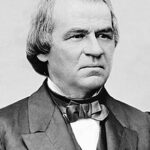The Constitutional Crisis
President Andrew Johnson faced the first Johnson impeachment trial in American history in 1868. The House of Representatives voted 126-47 to impeach him on February 24, 1868. Johnson was charged with violating the Tenure of Office Act by removing Secretary of War Edwin Stanton. ⚖️ Despite intense political pressure, Johnson chose to respect constitutional processes throughout the ordeal.
Johnson’s Peaceful Response
Johnson could have resisted the proceedings or challenged congressional authority. Instead, he participated fully in the Senate trial through his legal team. He provided requested documents and testimony when constitutionally required. Johnson’s compliance demonstrated respect for the separation of powers during a critical moment. 📊 His decision helped establish that no president is above the law or constitutional procedures.
Setting Democratic Precedents
The Johnson impeachment trial lasted from March 5 to May 26, 1868. Johnson was acquitted by just one vote in the Senate. He immediately accepted the verdict and continued serving as president until March 1869. This peaceful acceptance of constitutional outcomes became a model for future democratic transitions.
Impact:
Preserving Constitutional Order
Johnson’s compliance during the Johnson impeachment proceedings strengthened American democratic institutions. His participation validated the constitutional impeachment process outlined in Article II. 🏛️ Future presidents would understand that impeachment represents legitimate constitutional oversight, not political warfare. The precedent showed that executive power has limits within America’s system of checks and balances.
Long-term Democratic Benefits
Johnson’s peaceful acceptance of the Senate’s acquittal vote established crucial norms for democratic governance. He demonstrated that political disputes must be resolved through constitutional means rather than force. This precedent became essential during later presidential crises and transitions. 🌍 International observers noted America’s ability to handle constitutional crises without violence or military intervention.
Legacy for Future Generations
The Johnson impeachment trial created lasting frameworks for executive accountability. His respectful participation showed how presidents should respond to congressional oversight. Modern impeachment proceedings reference the Johnson case as a model of constitutional compliance. The peaceful resolution proved that American democracy could survive severe political divisions through adherence to constitutional principles and rule of law.
